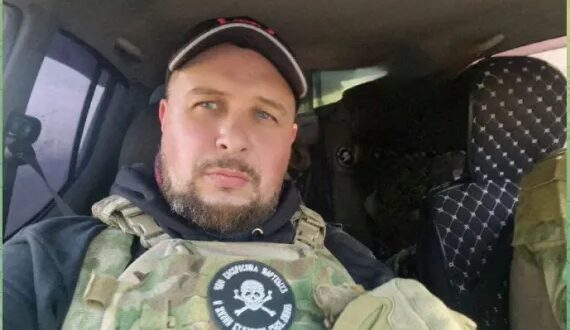Russia accuses Ukraine and the opposition of involvement but Kyiv says ‘the spiders are eating each other in a jar’.
Vladlen Tatarsky, a Russian pro-Kremlin war blogger with a criminal history, was killed in a bomb attack in a St Petersburg cafe on Sunday.
Thirty others were also wounded in the blast in Russia’s second-largest city – and the home of President Vladimir Putin – which came more than a year after Moscow sent troops into Ukraine.
Here’s what we know so far.
Who was Vladlen Tatarsky?
Tatarsky – whose real name was Maxim Fomin – was among the best-known members of an influential group of military bloggers who have provided a running commentary on Russia’s war in Ukraine.
The 40-year -old publicly demanded that Russia pursue the war even more aggressively and he had more than 500,000 followers on the Telegram messaging app.
His feed was full of ultra-nationalist posts as he critiqued Russia’s management of its so-called special military operation in Ukraine.
However, like most war bloggers, he avoided direct criticism of Putin.
Born in the Donbas, Ukraine’s eastern industrial heartland, Tatarsky worked as a coal miner before starting a furniture business. When he ran into financial difficulties, he robbed a bank and was sentenced to prison.
He fled from custody after a Russian-backed separatist rebellion engulfed the Donbas in 2014, weeks after Moscow annexed Ukraine’s Crimean Peninsula.
Then he joined separatist rebels and fought on the front line. When Russia invaded Ukraine, he again returned to combat but later turned to blogging.
Tatarsky was known for his blustery pronouncements and ardent pro-war rhetoric.
After Russia annexed four Ukrainian regions last year – a move most of the world rejects as illegal – Tatarsky was invited to a ceremony at the Kremlin, hosted by Putin. There, he posted a video in which he promised: “We will beat everyone. We will kill everyone. We will rob everyone who needs to be robbed. Everything will be the way we love. God is with us.”
What happened in the cafe in St Petersburg?
Tatarsky was giving a talk to an audience of about 100 people on Sunday evening at an event organised by a group called “Cyber Front Z”, whose name refers to the letter “Z”, a Russian pro-war symbol.
Investigators believe the bomb – that the suspect had given the blogger as a gift just before the explosion at the Street Food Bar No 1 cafe – was hidden in his bust.
A video making the rounds on social media, which Al Jazeera is unable to independently verify, shows Tatarsky joking about the figurine and putting it on the table next to him before the blast.
After the explosion, 25 people were wounded and 19 of them were hospitalised, according to the regional governor, Alexander Beglov.
According to reports, the police were called at 6:13pm local time (15:13 GMT).
Yevgeny Prigozhin, the head of Russia’s Wagner Group of mercenaries, previously owned the cafe. Tatarsky also had ties to Prigozhin.
Who is the suspect?
Russia’s Investigative Committee said on Monday that Darya Trepova, a 26-year-old woman from St Petersburg, had been arrested. The interior ministry placed her on its wanted list earlier but gave no further information about her.
“We understand that she was picked up early on Monday in an apartment about 40 minutes away from this cafe in St Petersburg,” Al Jazeera’s Dorsa Jabbari said, reporting from Moscow.
“I brought the statuette there that exploded,” Trepova has been filmed saying in a video released by Russian authorities. When asked who gave her the statuette, she says she will speak on this “later”.
According to unconfirmed Russian media reports, Trepova told investigators she was used as a carrier to deliver the explosive device but did not know that it was hidden in the bust.
Trepova is a Russian citizen who had previously been detained for protesting against Russian actions in Ukraine.
“She is someone that is known to officials … and …. according to the anti-terror committee that is part of the FSB Security Services in Russia, she is an active supporter of [opposition leader] Alexey Navalny’s group, a banned organisation in [the country],” Jabbari said.
What could have been the motive?
Tatarsky was the second high-profile war propagandist to be assassinated in Russia since its invasion of Ukraine in February 2022.
The first was Darya Dugina, the journalist daughter of prominent ultra-nationalist figure Alexander Dugin, who was killed by a car bomb near Moscow last August.
It is unclear who was behind Tatarsky’s death but the episode sends a warning to other members of this group that they could be targeted anywhere.
Tatarsky had survived extensive reporting trips on the war’s front lines but was ultimately killed hundreds of miles away, in a relatively safe Russian city.
Who could have been behind the attack?
The Kremlin lamented the killing as a “terrorist act” and claimed there was evidence linking Ukraine to the bombing – but did not provide any concrete details.
“The active phase of the investigation is now under way,” Kremlin spokesman Dmitry Peskov said.
“We see quite vigorous steps to detain suspects. Let’s be patient and wait for the next announcements from our special services, which are working on this.”
Mykhailo Podolyak, a Ukrainian presidential adviser, wrote on Twitter that it had only been a matter of time – “like the bursting of a ripe abscess” – before Russia would be consumed by what he called domestic terrorism.
“The spiders are eating each other in a jar,” he said.
Wagner chief Prigozhin said he doubts the involvement of Ukrainian authorities in the bombing, adding it was likely launched by a “group of radicals” unrelated to the government in Kyiv.
Ukrainian President Volodymyr Zelenskyy brushed off questions about the bombing.
“I don’t think about what is happening in St Petersburg or Moscow. Russia should think about this. I am thinking about our country,” Zelenskyy told journalists.
 Eurasia Press & News
Eurasia Press & News




